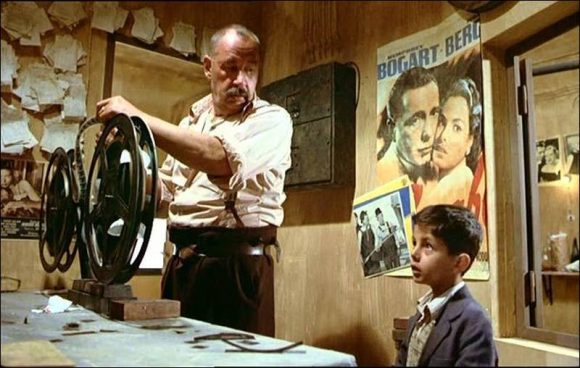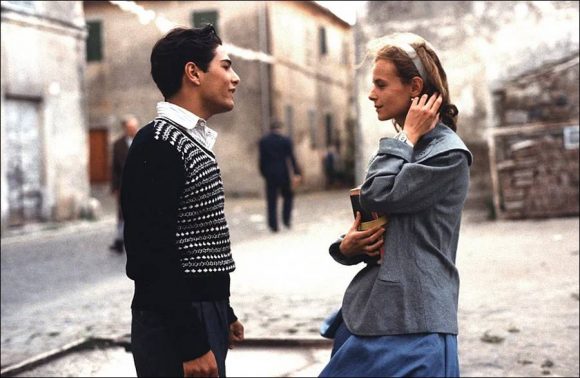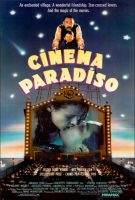Cinema Paradiso movie review. Receiving the news of the death of his old friend Alfredo, Salvatore ‘Toto’ Di Vita begins to remember his childhood memories that changed his life completely. As she remembers, she shudders, sorrows and rejoices. Nothing is left from her old life except for her passion for cinema. It is now one of the most famous directors of Italy. It has a beautiful house, car, bed and many women to fill that bed. In short, it has achieved everything it imagined.
The film takes place in three different periods of time: Salvatore’s childhood, youth and adulthood. The first part covers how Salvatore’s father-son relationship between Toto and Alfredo started and how he got stronger. In the second part, in the youth of Salvatore, Toto starts looking at the cinema projection instead of Alfredo. She also falls in love with a girl and her world changes. Alfredo is now more like a mentor to him than a father. He gives advice to Salvatore about life and tells stories. In the third part, we watch Salvatore’s peasant child, which we still cannot forget, turned into one of the respected elites of Italy.
Italian director Tornatore came across the person who will revive the character of Toto while he was traveling in the Sicilian countryside and after a few attempts, Salvatore Cascio decided that he was cut out for this role. Cascio is a peasant boy who has never studied acting before. So what makes him such a masterful actor in portraying the character of Toto? Is it talent? If it is talent, can true talent go blunt with age? He showed himself in a few films he made after Cinema Paradiso that Cascio was not a very talented actor.
While playing the character of S. Cascio Toto, he played with the consciousness and emotions of being a 9 year old child. In other words, this great acting exhibited may not be considered as talent since it does not occur with actor consciousness. When asked why Cascio was not involved in new projects in an interview he gave to the Guardian newspaper, he stated that he was acting as if he was continuing his life with completely natural feelings in his childhood, and that he did not want to spend much effort in this field because he never thought of acting as a profession. The Toto character we see in the movie also fully complies with the description given by Cascio. It is so natural that Toto manages to touch all of our lives. It makes some of us feel like their younger brothers, and some of us like their childhood friends.
As it is known, Italy has a special place in the world cinema. In addition to being the country that received the most Oscars in the best foreign language branch, it is the second country that has been awarded the Golden Palm prize the most after the USA. Italian directors (see Vittorio De Sica, Roberto Rossellini), who found an environment where their censored ideas could be freely expressed, especially after the murder of Mussolini (see Vittorio De Sica, Roberto Rossellini), conveyed poverty, political disorder and injustice with amateur actors.
This period called “Italian neorealsim” is considered as one of the most productive times of Italian cinema. Italy’s transition from Neorealism to the reflection of the inner world of individuals was with Fellini. The films of the successful director La Strada (1954) and Il Bidone (1955) contributed greatly to the Italian directors’ turning their camera from social troubles into the individual’s inner world.
Italian Cinema, which remained alive until 1980, especially with the films of great masters such as Fellini, Antonioni and Vittorio De Sica, entered a period of great pause until the late 80s. In these years, instead of producing quality original content, Italian cinema had an inefficient period with comedy films called “trash” which appeals to the general audience.
Here, the liberation of Italian cinema from this trash comedy era took place in 1988 with Cinema Paradiso. Cinema Paradiso, the masterpiece of realist films in person, has told the truth in such a simple and fluent style; it made us feel alive, not like watching the movie. He also managed to impress many films that will come after him with the message “Follow your passions”.
Especially after 1980, Italian Cinema, which became inefficient and lost its quality, was almost completely devoid of message-containing films that would keep the society vigorous. Cinema Paradiso was a source of life for the Italian Cinema, whose breath was cut in this deprivation. When he crowned his success with the Academy Award (1990) in the field of best foreign language film, the doors of a new era were opened for Italy. With the loss of influence of Trash comedy movies, the directors pursued original and quality works, Mediterraneo (1991), La vita ê bella (1997)).
Cinema Paradiso has made great contributions not only to Italian Cinema but also to world cinema. Even in today’s cinema, its echoes still continue. To give an example from Turkish cinema, the films “My Father and My Son” and “My Grandfather’s People”, which were released under the direction of Çağan Irmak, were influenced by Cinema Paradiso with their realist approach and telling the evolution of society. Another influence is seen in the movie İftarlık Gazoz, directed by Yüksel Aksu.
In this movie, the master-apprentice relationship was handled in a similar manner to Cinema Paradiso and the story of the movie started with the flashback of the main character (Adam) just like in Cinema Paradiso. In addition, the social and religious structure of the society is depicted in a realistic style. However, differently, the main theme of İftarlık Gazoz and Çağan Irmak’s two films, which I mentioned, was shaped not by the message of “following the passions” but by the “rebellion against the unjust social order”.
Cinema Paradiso has opened a new era in Italian cinema due to the historical period it was shot, as well as being a movie with a great pleasure with its narrative technique, acting and entertaining scenario. In addition, it has made a name for itself with its effects in the world cinema and will continue to be mentioned in the future.
All about Cinema Paradiso movie.
Cinema Paradiso (1988)
Directed by: Giuseppe Tornatore
Starring: Philippe Noiret, Enzo Cannavale, Antonella Attili, Leo Gullotta, Marco Leonardi, Agnese Nano, Salvatore Cascio, Tano Cimarosa, Pupella Maggio, Jacques Perrin
Screenplay by: Giuseppe Tornatore
Production Design by: Andrea Crisanti
Cinematography by: Blasco Giurato
Film Editing by: Mario Morra
Costume Design by: Beatrice Bordone
Music by: Ennio Morricone
MPAA Rating: R for some sexuality.
Distributed by: Miramax Films
Release Date: November 17, 1988 (Italy), February 2, 1990 (USA)
Visits: 195





